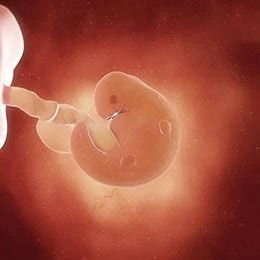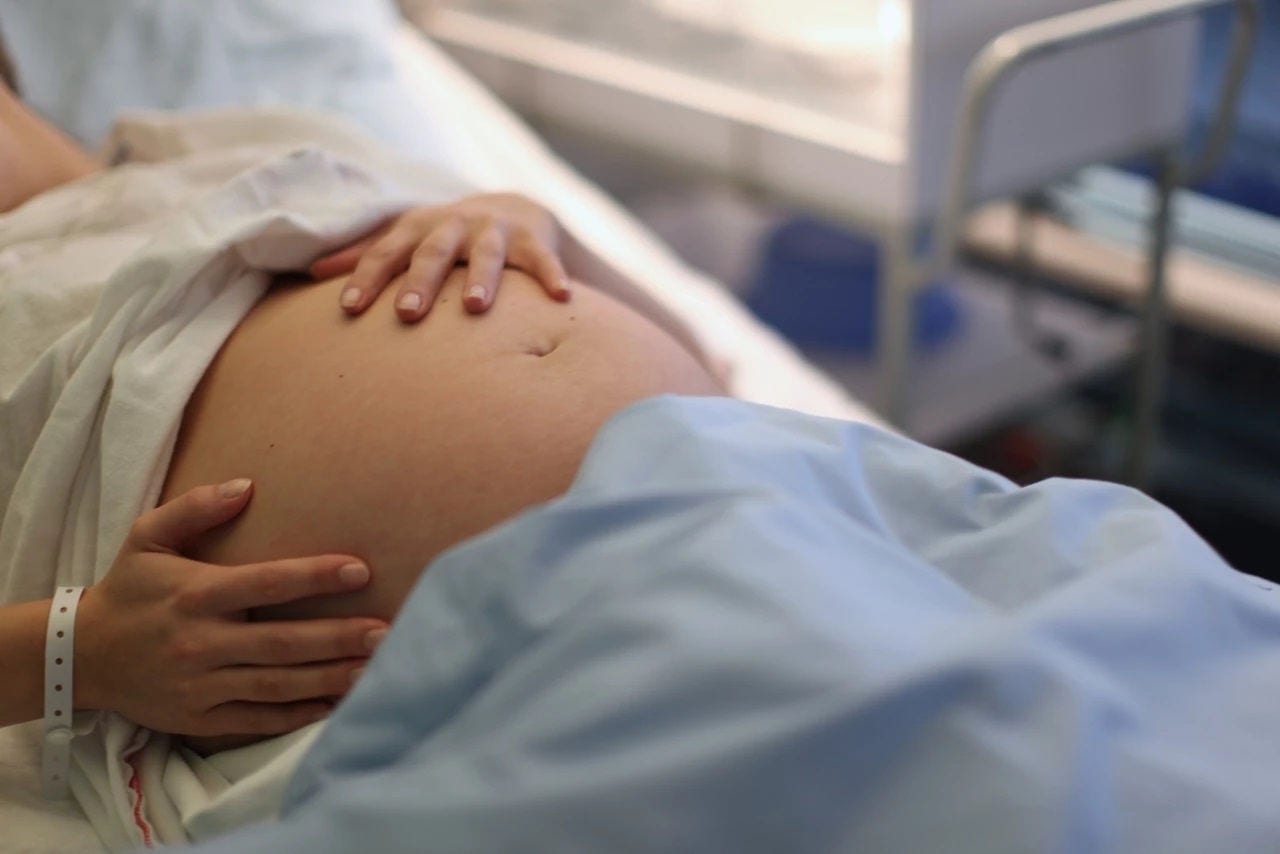Your baby’s vital organs are developing fast, including their heart¹.
Baby development at 5 weeks
What does my baby look like? And, what size is my baby?
In week 5 of pregnancy, your baby, technically called an embryo, measures a little over 1mm long¹ – that’s roughly the size of a sesame seed. But already their brain, spinal cord and blood vessels are beginning to develop, albeit on a microscopic scale². Their circulatory system is also developing and it’s at around the end of week 5 that your baby’s heart starts to beat¹.
Meanwhile, the umbilical cord, which will deliver nutrients to your baby, is beginning to form². The amniotic sac, soon to be filled with a clear, pale fluid to cushion your baby, starts to take shape too³.
Pregnancy at 5 weeks (first trimester)
What’s happening in my body?
This may be the week that you find out for certain that you’re pregnant. If you’re not convinced by the absence of your period or other symptoms such as tender breasts and tiredness, at 5 weeks your hormone levels should be high enough to confirm the news on a home pregnancy test4.
Early pregnancy symptoms at 5 weeks5

Early pregnancy symptoms vary from person to person. At 5 weeks, you may experience any of the following signs of pregnancy, or no symptoms at all:
Your breasts may become larger and feel sore. You may also find your nipples stick out more than usual and darken in colour as your body begins to prepare for breastfeeding.
During the first 12 weeks, hormonal changes can leave you feeling tired or exhausted.
Morning sickness affects up to 80% of mums-to-be in the first trimester6. It can strike at any time of the day or night and varies from mild nausea to sickness throughout the day.
The pregnancy hormone progesterone slows down your digestion which can lead to bloating and excess gas7.
Light cramping and spotting are common in the early stages of pregnancy8,9. If the pain becomes severe (stronger than period cramps) or if bleeding becomes heavy, you should talk to your GP.
Frequent trips to the bathroom are one of the most common symptoms of early pregnancy, as your growing uterus begins to put pressure on your bladder.
- Deans A. Your New Pregnancy Bible, The experts’ guide to pregnancy and early parenthood. 4th ed. London: Carroll & Brown Publishers Limited, 2013. p. 31.
- NHS. You and your baby at 0-8 weeks pregnant [Online]. Available at: www.nhs.uk/conditions/pregnancy-and-baby/pages/pregnancy-weeks-4-5-6-7-8.aspx Page last reviewed: 17 July 2018. Next review due: 17 July 2021.
- NHS. What is the amniotic sac? [Online]. Available at: www.nhs.uk/chq/pages/2310.aspx Page last reviewed: 26 September 2018. Next review due: 26 September 2021.
- NHS. Doing a pregnancy test [Online]. Available at: www.nhs.uk/Conditions/pregnancy-and-baby/pages/pregnancy-test.aspx Page last reviewed: 1 October 2018. Next review due: 1 October 2021.
- NHS. Signs and symptoms of pregnancy [Online]. Available at: https://www.nhs.uk/conditions/pregnancy-and-baby/signs-and-symptoms-pregnancy/ Page last reviewed: 6 October 2018. Next review due: 6 October 2021.
- Noel M. Lee, M.D., Gastroenterology Fellow and Sumona Saha, M.D., Assistant Professor of Medicine. Nausea and Vomiting of Pregnancy. 2011. Pub 2013. [Online] Available at: https://www.ncbi.nlm.nih.gov/pmc/articles/PMC3676933/
- NHS Start 4 Life. 1st trimester, week 10 [Online]. Available at: https://www.nhs.uk/start4life/pregnancy/week-by-week/1st-trimester/week-ten/
- NHS. Vaginal bleeding in pregnancy [Online]. Available at: https://www.nhs.uk/conditions/pregnancy-and-baby/vaginal-bleeding-pregnant/ Page last reviewed: 26 January 2018. Next review due: 26 January 2021.
- NHS. Stomach pain in pregnancy [Online]. Available at: https://www.nhs.uk/conditions/pregnancy-and-baby/stomach-pain-abdominal-cramp-pregnant/ Page last reviewed: 1 May 2018. Next review due: 1 May 2021.
- Claudio N. Soares and Brook Zitek. Reproductive hormone sensitivity and risk for depression across the female life cycle: A continuum of vulnerability? 2008. [Online] Available at: https://www.ncbi.nlm.nih.gov/pmc/articles/PMC2440795/
Last reviewed: 13th May 2022
Reviewed by Nutricia’s Medical and Scientific Affairs Team
Related articles
Pregnancy topics
Any more questions?
Our specialist baby advisors and experienced mums are here to talk and ready to help whenever you need them.
Ask us a question (8am - 8pm Mon-Fri, 10am - 5pm Weekends)
Email us
Send us an email (8am-8pm Mon-Fri, 10am-5pm Sat)
Call Us
Call us on 1800 570 570 (8am-8pm Mon-Fri, 10-5pm Sat)
FAQs
For all the latest information














